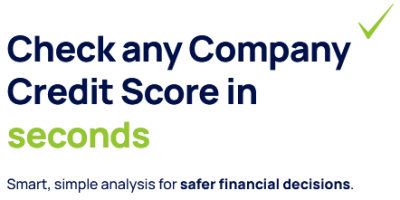Understanding credit ratings is crucial for evaluating how financially stable and reliable businesses are. In the UK, company credit reports give valuable insights into a company’s creditworthiness, which is influenced by its financial history, how it pays bills, and any public records like legal filings or bankruptcies. Here’s what you need to know to navigate these reports effectively.
What is a credit rating?
A company’s probability of repaying its debts is indicated by its credit rating, which is a number. Ratings range from 1 to 100, with higher scores meaning lower risk. An increased score indicates a higher probability of timely bill payment by the company.
Factors Affecting Credit Ratings
Several things affect a company’s credit rating:
- History of Payment: An organisation’s credit score is increased when payments are made on schedule.
- Financial Stability: Profitability, liquidity, and debt-to-equity ratio all affect how creditworthy a company appears.
- Public Records: Legal actions like bankruptcies can lower a credit rating.
- Credit Use: Using a lot of available credit can lower a company’s score.
Understanding credit ratings
It’s important to know how to read credit ratings:
- High Credit Rating (75–100): This means a very low risk of not paying debts. Companies with high ratings are usually financially strong.
- Medium Credit Rating (50–74): suggests moderate risk. These companies might have some financial challenges but generally meet their commitments.
- Low Credit Rating (1-49): Shows higher risk. Companies with low ratings might struggle financially or have been late paying bills.
Why Credit Ratings Matter
Credit ratings affect how businesses operate.
- Supplier Relationships: Companies with higher ratings can negotiate better terms with suppliers.
- Access to Finance: Banks use ratings to decide if they should lend money and at what interest rate.
- Business Partnerships: Potential partners might check ratings to decide if a company is reliable.
Using Checkaco for Credit Reports
Checkaco offers detailed reports, including:
- Credit Scores: Clear ratings that show how creditworthy a company is.
- Financial Details: Insights into a company’s finances, like profit trends and cash flow.
- Risk Assessment: Identifying potential problems based on past data.
Conclusion
Understanding credit ratings in UK company credit reports means knowing what affects ratings and how it impacts business choices. Checkaco’s services can help companies understand their financial health and make smart decisions about partnerships, loans, and investments.
For more insights and to see detailed credit reports, visit Checkaco. Knowing about credit ratings helps businesses avoid financial risks and take advantage of opportunities in a competitive market.

